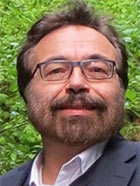IEEE SPS-DSI Webinar: 19 October 2022, by Dr. Panagiotis A. Traganitis and Dr. Georgios B. Giannakis

IEEE SPS DSI Webinar
(Signal Processing and Data Science Initiative, Data SciEnce on GrAphS (DEGAS) )
Title: Learning from Unreliable Labels via Crowdsourcing
Date: 19 October 2022
Time: 3:00 PM Paris time (Local time | add to calendar)
Duration: Approximately 1 Hour
Presenters: Dr. Panagiotis A. Traganitis, Dr. Georgios B. Giannakis
Register for the webinar to acquire Zoom link!
About the topic:
Crowdsourcing has emerged as a powerful paradigm for tackling various machine learning, data mining, and data science tasks, by enlisting inexpensive crowds of human workers, or annotators, to accomplish learning and inference tasks. While conceptually related to distributed data and decision fusion, crowdsourcing seeks to not only aggregate information from multiple human annotators or unreliable (a.k.a. weak) sources, but to also assess their reliabilities. Crowdsourcing can thus be readily adapted to information fusion tasks in contested environments, where data may be provided from unreliable and even adversarial agents. Focusing on the classification task, exposition will include label aggregation, moments of annotator responses, dependencies of dynamic networked data, Gaussian Process-, and Deep Learning-based crowdsourcing demonstrated through extensive tests.
About the presenter:

Panagiotis A. Traganitis received the Diploma in Electrical and Computer Engineering from the National Technical University of Athens, Greece, in 2013, the M.Sc. degree in Electrical Engineering in 2015, and the Ph.D. degree in Electrical Engineering in 2019, both from the University of Minnesota (UMN), Twin Cities.
From 2019 to 2022, he was a postdoctoral researcher with the Department of Electrical and Computer Engineering (ECE) at the University of Minnesota, Twin Cities. In August 2022, he joined the ECE department at Michigan State University as an Assistant Professor. His research interests include statistical signal processing and learning, crowdsourcing and weak supervision, distributed learning, big data analytics, and network science.

Giorgios_Giannakis received the Diploma in Electrical Engineering (EE) from the National Technical University of Athens, Greece, in 1981. From 1982 to 1986, he was with the University of Southern California (USC), where he received the MSc. degree in EE in 1983, the MSc. degree in Mathematics, 1986, and the Ph.D. degree in EE, 1986.
He was with the University of Virginia from 1987 to 1998, and since 1999, he has been with the University of Minnesota (UMN), where he held an Endowed Chair of Telecommunications, served as director of the Digital Technology Center from 2008 to 2021, and since 2016, he has been a UMN Presidential Chair in ECE. His interests span the areas of statistical learning, communications, and networking - subjects on which he has published more than 485 journal papers, 790 conference papers, 25 book chapters, two edited books and two research monographs. His current research focuses on Data Science with applications to IoT, and power networks with renewables.
Dr. Giannakis is the (co-) inventor of 36 issued patents, and the (co- )recipient of 10 best journal paper awards from the IEEE Signal Processing (SP) and Communications Societies, including the G. Marconi Prize. He also received the IEEE-SPS ‘Nobert Wiener’ Society Award (2019); EURASIP’s ‘A. Papoulis’ Society Award (2020); Technical Achievement Awards from the IEEE-SPS (2000), and from EURASIP (2005); the IEEE ComSoc Education Award (2019); and the IEEE Fourier Technical Field Award (2015). He is a member of the Academia Europaea, the Academy of Athens, Greece, and Fellow of the US National Academy of Inventors, the European Academy of Sciences, IEEE, and EURASIP. He has served the IEEE in a number of posts, including that of a Distinguished Lecturer for the IEEE-SPS.

